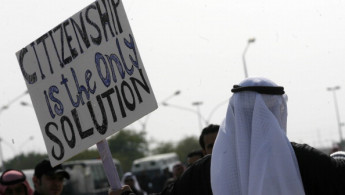Stateless Bidoon activists in Kuwait enter third week of hunger strike
Activists from Kuwait's Bidoon minority have entered the third week of their hunger strike in a continuing attempt to pressure the government to give them their full rights.
The Bidoon are a stateless Arab minority group in Kuwait who were not registered for citizenship at the time of the country's independence or shortly thereafter.
They have been denied their rights to citizenship and are discriminated against in healthcare, education and other essential services.
At the end of March, a group of activists began a hunger strike and launched the #Bedoon_strike hashtag in English and Arabic.
"In solidarity with the stateless people on hunger strike. Personally, my family has reached 5 generations of statelessness, many of us with Kuwaiti mothers. Leaving gave me my basic human rights, and robbed me of my language, culture, and family," tweeted US-based writer Zahra Marwan.
For over 70 years, citizenship, and other basic rights have been denied to Kuwait's Bedoon population. Many of them serve in the military and Police. #Bedoon_strike #Kuwait#اضراب_البدون2 #اضراب_البدون pic.twitter.com/lrK8SdwZX1
— F اضراب_البدون# (@75f_) April 11, 2022
The Kuwaiti government had been silent about the protests until Sunday, when activists from the town of Sulaibiya said they were threatened by the local municipality.
Authorities told protesters to disband their sit-in or else be forced out on the grounds that they did not have a permit to build their tents.
Previous attempts to protests for Bidoon rights have been met with violent police crackdowns.
In January 2020, Bidoon activists faced a number of charges including participation in unlicensed demonstrations, spreading "false news" and state security offences.
"The Kuwaiti authorities have arbitrarily arrested more than a dozen protesters in recent days, including prominent human rights defender Abdulhakim al-Fadhli and other activists, in a crackdown on peaceful protestors demanding greater rights for the stateless group known as Bidoon," Amnesty said in a statement at the time.
There are no official statistics on the Bidoon population in Kuwait, but their numbers are estimated to be between 100,000 and 200,000.
Similar communities exist in some other Gulf states, which, like Kuwait, offer a generous welfare system to citizens but not to the stateless.
Kuwait claims most of its Bidoon population are migrants from other countries who hid their nationalities and classifies them as illegal residents.
Rights groups have repeatedly accused Kuwait of mistreating the Bidoon, saying the Gulf country has failed to recognise their right to citizenship.
Authorities have intensified pressure on the community over the last two years to "reveal their country of origin" or accept an "assigned citizenship" based on investigations by Kuwaiti state security services.





 Follow the Middle East's top stories in English at The New Arab on Google News
Follow the Middle East's top stories in English at The New Arab on Google News


